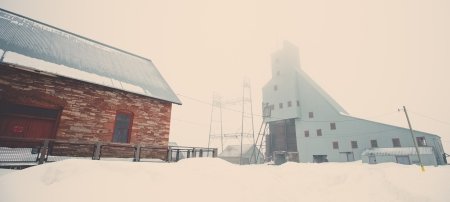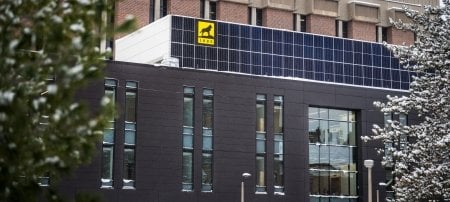High-tech startup companies are revitalizing the Copper Country. The Michigan Tech Enterprise Corporation (MTEC) SmartZone—formed to nurture high-tech start-ups—confirms it, and the firms themselves—dozens of companies—have created hundreds of jobs.
The Michigan Economic Development Corporation (MEDC)—the state agency charged with promoting exactly this kind of economic revitalization—credits the upward arc to the SmartZone and Michigan Tech.
"The MTEC SmartZone in Houghton has a tremendous impact on the local and regional economy," says Fred Molnar, MEDC's vice president of entrepreneurship and innovation. "And Michigan Tech is a strong partner in helping high-tech startups develop and flourish. Between Michigan Tech and the SmartZone, attracting and retaining talent has been a great success."
Meet two recently formed startups that are working hand-in-hand with Michigan Tech to develop and market the high-tech products and services that are helping turn the Copper Country economy around.
Neuvokas
Basalt. You see it everywhere in the Copper Country. It's the volcanic rock from which the area's namesake ore was extracted, leaving piles of fragments still rich with copper and silver.
So, thought Erik Kiilunen and Ken Keranen—businessmen, engineers, and fiercely loyal residents of the Keweenaw—why not use local basalt to make the rebar that reinforces concrete in roads, bridge decks, and buildings? Basalt fiber-based rebar would be stronger, lighter, and more resistant to alkalinity, which can cause concrete to expand and crack.
Three years ago, Neuvokas was born. Neuvokas is a Finnish word that means "inventive and creative." The Neuvokas Corporation, with a manufacturing plant in Ahmeek, has invented a new, high-speed process to produce cost-effective fiber-reinforced polymer (FRP) rebar that is already making an impact on the construction industry across the nation.
Keranen is a 2003 Michigan Tech mechanical engineering alumnus, and the company's first hire was Matt Kero, a 2006 mechanical and biomedical engineering alumnus who joined Neuvokas as vice president for engineering, the role he still plays today.
With the help of the SmartZone, Neuvokas secured funding for the venture: a $40,000 State of Michigan business accelerator fund grant. This initial grant has since snowballed into a $150,000 Phase I Small Business Innovation Research (SBIR) grant that has grown to $875,000 with the addition of a Phase II SBIR.
The company refurbished an old mining building in Ahmeek and built a rebar manufacturing facility from the ground up.
"We had to invent the process," says Kero, who is so proud of his company's product that he hands out key chains sporting small rods of the rough, black rebar. The rebar is 80 percent basalt fiber and 20 percent polymer resin.
With the rebar production process developed and process speed increasing regularly, Neuvokas will begin turning its attention to producing the basalt fiber it uses in its rebar. If possible, the company intends to use the local poor rock from mining activities of years past.
"Assuming we can do this, extract the copper and silver from the poor rock and turn what used to be waste basalt into fiber, Neuvokas will truly have a triple bottom-line venture," says Kiilunen. "We can provide meaningful local employment while producing a valuable product for export, and at the same time potentially cleaning up our local environment. This is a rare opportunity, and Neuvokas is aggressively pursuing it."
Until this is developed, the company will continue to buy its basalt fiber from China, 40,000 pounds at a time.
Neuvokas has cracked a major market in Houston, Texas. Last fall, the company shipped 250,000 feet of FRP rebar to Houston. It weighed seven times less than the same amount of steel rebar. Kero likes to say that FRP rebar can be shipped on a pickup truck instead of a flatbed.
"Any time we can help these little companies grow and become stable, it's good for everybody."Paul Fraley
With Michigan Tech alumni at its heart, it's no wonder that Neuvokas is forging strong ties with Michigan Tech. Paul Fraley, an engineer-scientist in the Department of Materials Science and Engineering, and his students are testing Neuvokas's rebar. They're doing tensile strength and shear tests, durability testing, creep testing, and fatigue testing to determine the conditions that would make the rebar fail.
"We're simulating some of the worst-case conditions the rebar will see in concrete," Fraley explains.
The testing has demonstrated that the FRP basalt rebar is stronger than a fiberglass bar and twice as strong as some grades of steel rebar. Also, "it's great experience for the students," says Fraley.
"Any time we can help local startups grow and become stable, it's good for everybody," he adds. "It's good for the community; it's good for the economy. And it enables a few lucky students to stay and work in the Copper Country after graduation."
That's already happening at Neuvokas. The company has expanded to 10 employees, including a Michigan Tech student intern, and Kero hopes to have 30 employees within the next couple of years. "We're planning to start a second shift soon," he says.
Jeff Ratcliffe, executive director of the Keweenaw Economic Development Alliance, credits Michigan Tech with playing "a pivotal role in not only spawning technology and entrepreneurs that evolve into companies and new jobs, but in providing the engineering, research, and development talent that our startups and existing companies depend on to succeed."
GS Infrastructure
Lynn Eliason has never slammed into the glass ceiling, so she wasn't surprised when Glen Simula, president of GS Engineering, asked her to be president of a new spinoff company, GS Infrastructure.

"I've never been singled out for being a woman," says Eliason, whose company offers non-destructive evaluation services to analyze the infrastructure of bridge decks. The fledgling firm, almost one year old, already has customers in 10+ states and the District of Columbia, mostly departments of transportation and civil construction companies that contract to manage bridges.
GS Infrastructure uses imaging technologies like infrared thermography—which measures heat transfer to "see" cracks or other areas showing stress under the surface of the bridge—and ground-penetrating radar that produces 3-D images of the situation deep inside.
Until these technologies came along, evaluating the structural problems of bridge involved chain-dragging and hammer-sounding—literally dragging a chain across the bridge surface or pounding on it with a hammer, to listen for sound variations that might indicate cracks or other issues. It is slow, labor-intensive, and behind in technological advances.
Using GS Infrastructure sensor technologies, bridge managers can see exactly where and how much of a bridge is compromised and how seriously. "We give them the tools to decide what has to happen," says Eliason. "Do I want to patch it? Do I need to replace it? They can see the answers." Eliason, who has a BA in Business Administration from Michigan Tech and a Master's in Leadership from Marquette University, had worked with GS Engineering in Houghton as director of operations for the past five years.
When Simula decided to create a civil arm to his enormously successful GS Engineering—MTEC SmartZone's first and greatest startup accomplishment—he tapped Eliason, who said she didn't hesitate to say yes.
"I like to accept a challenge," she explains. The first year has been a bit of a roller coaster," says Eliason, "making sure we have all the right resources, the skill sets, the right technologies, and the right people, problem-solvers who are willing to learn and to ride the ups and downs." Those problem-solvers are a big reason that GS Infrastructure—and GS Engineering—love their location, its proximity to Michigan Tech. Eighty-five percent of their employees are Michigan Tech graduates. "They are excellent problem-solvers," Eliason explains. "They know how to work in a team and follow through to a solution. They know how to move ahead."
"It enables a few lucky students to stay and work in the Copper Country after graduation."Paul Fraley
GS Infrastructure already has one student intern and plans to hire more in the coming school year. "We appreciate how many skills interns from Michigan Tech bring with them and apply those skills with our companies," says Eliason.
One of GS Infrastructure's past projects was a joint one with the Michigan Tech Research Institute (MTRI), using infrared thermography field scoping to analyze the infrastructure of bridges and roads, as part of a larger project for the Michigan Department of Transportation.
"GS Infrastructure is a good example of a local engineering company developing sensor technology, then teaming with the civil engineering department at Michigan Tech to conduct a research project for MDOT," says Simula. "This demonstrates the synergy of a Michigan small business working with Michigan Tech faculty to solve current problems for our nation's aging infrastructure."
The sensors are already being used on bridge decks across the nation. And GS Infrastructure is just getting started. The same technologies can be adapted for roads. Then on to airport runways. You might say the sky's the limit for this Keweenaw startup.
Michigan Technological University is a public research university founded in 1885 in Houghton, Michigan, and is home to more than 7,000 students from 55 countries around the world. Consistently ranked among the best universities in the country for return on investment, Michigan’s flagship technological university offers more than 120 undergraduate and graduate degree programs in science and technology, engineering, computing, forestry, business and economics, health professions, humanities, mathematics, social sciences, and the arts. The rural campus is situated just miles from Lake Superior in Michigan's Upper Peninsula, offering year-round opportunities for outdoor adventure.






